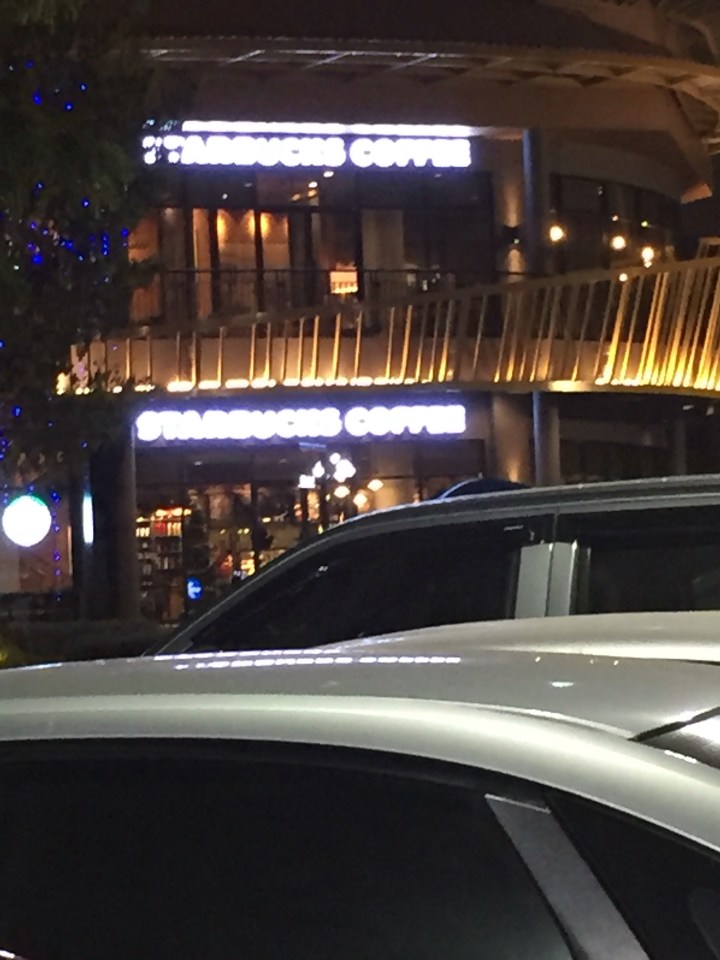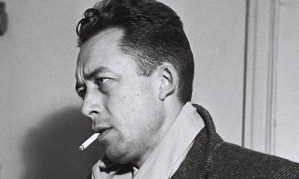 Starbucks is an incredibly cool and aspirational brand in Thailand. In some ways, this double decker Starbucks is an emblem of their love for the brand. On the other hand, they original idea of Starbucks, where you sit and work and drink coffee – a place that mimicked the social aspect of seventeenth century coffeehouse (and the coffeehouses of my late adolescence and early twenties) – is not common. While coffee places are so prevalent as to make Seattle seem positively coffee starved, Starbucks is one of the few with significant sitting areas. It’s an in and out culture, rather like what Starbucks is currently in America.
Starbucks is an incredibly cool and aspirational brand in Thailand. In some ways, this double decker Starbucks is an emblem of their love for the brand. On the other hand, they original idea of Starbucks, where you sit and work and drink coffee – a place that mimicked the social aspect of seventeenth century coffeehouse (and the coffeehouses of my late adolescence and early twenties) – is not common. While coffee places are so prevalent as to make Seattle seem positively coffee starved, Starbucks is one of the few with significant sitting areas. It’s an in and out culture, rather like what Starbucks is currently in America.
Weekend Reading – Don’t Start What You Can’t Finish
‘Pound The Hill’ Getting New Ownership
When Pound the Hill first opened up, it was pretty exciting. They made a great cup of coffee – for a while, they were even better than the folks at Peregrine Espresso, which is high praise.
But then they lost their way and got confused about what they wanted to be – or rather, they weren’t confused, they just didn’t want to be a coffee place anymore, which is what I wanted them to be. They tried to become a wine bar and restaurant with unusual, awkward, coffeehouse style seating options. On Sunday, I couldn’t get a coffee, pastry, paper, and a seat, because most seating was reserved for people who wanted brunch.
So, I stopped going.
Now, Bourbon Coffee is taking over and I’m really hoping that they focus on the core business of… coffee.
‘The Pleasures and Pains of Coffee’

by Honore de Balzac
translated from the French by Robert OnopaCoffee is a great power in my life; I have observed its effects on an epic scale. Coffee roasts your insides. Many people claim coffee inspires them, but, as everybody knows, coffee only makes boring people even more boring. Think about it: although more grocery stores in Paris are staying open until midnight, few writers are actually becoming more spiritual.
But as Brillat-Savarin has correctly observed, coffee sets the blood in motion and stimulates the muscles; it accelerates the digestive processes, chases away sleep, and gives us the capacity to engage a little longer in the exercise of our intellects. It is on this last point, in particular, that I want to add my personal experience to Brillat-Savarin’s observations.
Coffee affects the diaphragm and the plexus of the stomach, from which it reaches the brain by barely perceptible radiations that escape complete analysis; that aside, we may surmise that our primary nervous flux conducts an electricity emitted by coffee when we drink it. Coffee’s power changes over time. [Italian composer Gioacchino] Rossini has personally experienced some of these effects as, of course, have I. “Coffee,” Rossini told me, “is an affair of fifteen or twenty days; just the right amount of time, fortunately, to write an opera.” This is true. But the length of time during which one can enjoy the benefits of coffee can be extended.
For a while – for a week or two at most – you can obtain the right amount of stimulation with one, then two cups of coffee brewed from beans that have been crushed with gradually increasing force and infused with hot water.
For another week, by decreasing the amount of water used, by pulverizing the coffee even more finely, and by infusing the grounds with cold water, you can continue to obtain the same cerebral power.
When you have produced the finest grind with the least water possible, you double the dose by drinking two cups at a time; particularly vigorous constitutions can tolerate three cups. In this manner one can continue working for several more days.
Finally, I have discovered a horrible, rather brutal method that I recommend only to men of excessive vigor, men with thick black hair and skin covered with liver spots, men with big square hands and legs shaped like bowling pins. It is a question of using finely pulverized, dense coffee, cold and anhydrous, consumed on an empty stomach. This coffee falls into your stomach, a sack whose velvety interior is lined with tapestries of suckers and papillae. The coffee finds nothing else in the sack, and so it attacks these delicate and voluptuous linings; it acts like a food and demands digestive juices; it wrings and twists the stomach for these juices, appealing as a pythoness appeals to her god; it brutalizes these beautiful stomach linings as a wagon master abuses ponies; the plexus becomes inflamed; sparks shoot all the way up to the brain. From that moment on, everything becomes agitated. Ideas quick-march into motion like battalions of a grand army to its legendary fighting ground, and the battle rages. Memories charge in, bright flags on high; the cavalry of metaphor deploys with a magnificent gallop; the artillery of logic rushes up with clattering wagons and cartridges; on imagination’s orders, sharpshooters sight and fire; forms and shapes and characters rear up; the paper is spread with ink – for the nightly labor begins and ends with torrents of this black water, as a battle opens and concludes with black powder.
I recommended this way of drinking coffee to a friend of mine, who absolutely wanted to finish a job promised for the next day: he thought he’d been poisoned and took to his bed, which he guarded like a married man. He was tall, blond, slender and had thinning hair; he apparently had a stomach of papier-mache. There has been, on my part, a failure of observation.
When you have reached the point of consuming this kind of coffee, then become exhausted and decide that you really must have more, even though you make it of the finest ingredients and take it perfectly fresh, you will fall into horrible sweats, suffer feebleness of the nerves, and undergo episodes of severe drowsiness. I don’t know what would happen if you kept at it then: a sensible nature counseled me to stop at this point, seeing that immediate death was not otherwise my fate. To be restored, one must begin with recipes made with milk and chicken and other white meats: finally the tension on the harp strings eases, and one returns to the relaxed, meandering, simple-minded, and cryptogamous life of the retired bourgeoisie.
The state coffee puts one in when it is drunk on an empty stomach under these magisterial conditions produces a kind of animation that looks like anger: one’s voice rises, one’s gestures suggest unhealthy impatience: one wants everything to proceed with the speed of ideas; one becomes brusque, ill-tempered about nothing. One actually becomes that fickle character, The Poet, condemned by grocers and their like. One assumes that everyone is equally lucid. A man of spirit must therefore avoid going out in public. I discovered this singular state through a series of accidents that made me lose, without any effort, the ecstasy I had been feeling. Some friends, with whom I had gone out to the country, witnessed me arguing about everything, haranguing with monumental bad faith. The following day I recognized my wrongdoing and we searched the cause. My friends were wise men of the first rank, and we found the problem soon enough: coffee wanted its victim.
Whenever I fragrant coffee drink,
I on the generous Frenchman think,
Whose noble perseverance bore,
The tree to Martinico’s shore.– Charles Lamb
Weekend Reading – No, You Are Not That Hip
 Okay, this list of top twenty hipster cities… first of all, West Des Moines is a somewhat tony suburb of Des Moines and no, it is not hipster. That ratio of cafes to residents must include Starbucks located inside grocery stores. Oddly, the East Des Moines Village, a neighborhood inside Des Moines proper, is actually pretty hipsterific.
Okay, this list of top twenty hipster cities… first of all, West Des Moines is a somewhat tony suburb of Des Moines and no, it is not hipster. That ratio of cafes to residents must include Starbucks located inside grocery stores. Oddly, the East Des Moines Village, a neighborhood inside Des Moines proper, is actually pretty hipsterific.
Weekend Reading – Camus Sends His Regrets
‘Tinker Tailor Soldier Spy’ At The Hill Center
Last Thursday, the Hill Center showed the first two episodes of the 1978 BBC miniseries, Tinker Tailor Soldier Spy.
I read the book once, years ago. And I did see this miniseries, though many years ago and not at an age old enough to entirely understand. And I loved the recent movie.
But this is the difference between a 2+ hour movie and a six episode series. Rather like comparing the Keira Knightley Pride Prejudice with the Jennifer Ehle and Colin Firth epics. The first one had its not insignificant charms, but they’re such different animals, it’s wrong to compare.
The host of this showing told us a lovely little gobbet about the production. He said that Alec Guinness was not very good at memorizing his lines and he sat down with the screenwriter and John Le Carre to systematically reduce the number of his lines.
The main joys are seeing things without the shorthand. The movies depend on narrative shorthand, but this can take it’s time. It’s not a long novel, so by making a 5 hour or so long version, the production team is able to less dense in the information it imparts in every scene and to dish it out very slowly and build characters over greater time. Again, less shorthand.
Anyway… episodes three and four will be shown Thursday. I’ll be there.



